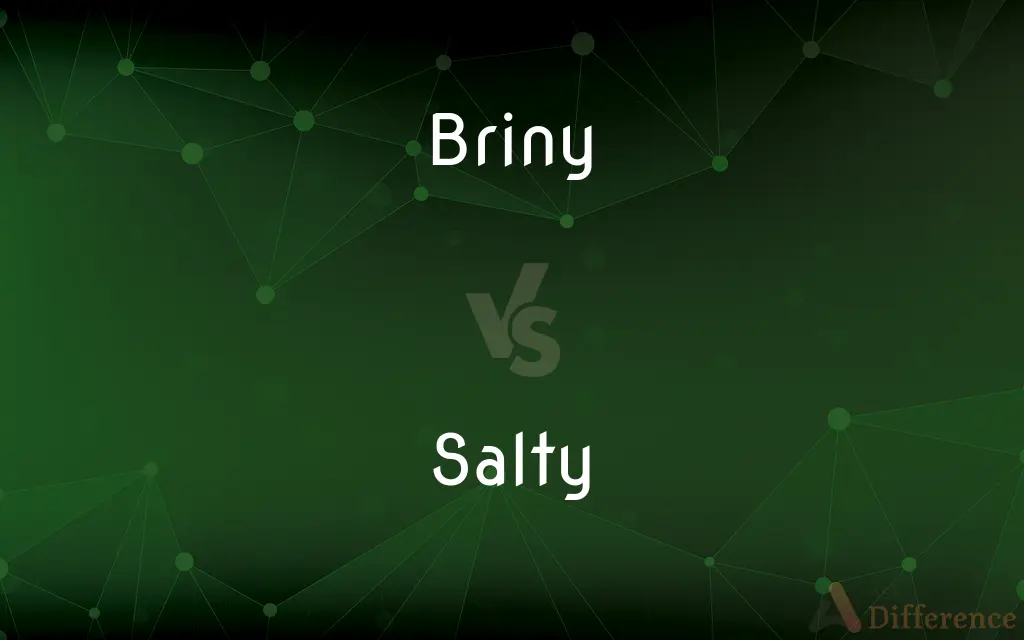Briny vs. Salty — What's the Difference?
By Tayyaba Rehman & Fiza Rafique — Updated on April 6, 2024
Briny refers to the salty taste of seawater, often associated with a strong oceanic flavor, whereas salty denotes a broader taste sensation resulting from the presence of salt, without specific oceanic associations.

Difference Between Briny and Salty
Table of Contents
ADVERTISEMENT
Key Differences
Briny is a term specifically used to describe the taste or quality reminiscent of seawater. It evokes a strong, often pleasingly salty flavor that is typically associated with seafood or coastal regions. This term not only encompasses the sensation of saltiness but also carries connotations of the sea and its unique mineral content. On the other hand, salty is a more general descriptor for the basic taste sensation produced by salt, applicable to a wide range of foods and contexts. Salty does not necessarily imply any connection to the sea or maritime flavors but simply indicates the presence of salt as a dominant taste.
When describing food, "briny" is often used to highlight a desirable quality in seafood, pickles, or olives, suggesting a freshness and flavor depth that evokes the ocean. Whereas "salty" can describe any food that contains a noticeable amount of salt, from snacks like chips or nuts to dishes that are heavily seasoned. The distinction here emphasizes not just the presence of salt, but the character and source of the saltiness.
In culinary contexts, brininess is sometimes sought after for its ability to add a complex flavor profile that enhances the taste of seafood dishes, dressings, or marinades, offering a sense of freshness and authenticity. Salty, while also a key taste sensation, is more about achieving a balance in the food's overall flavor profile, enhancing sweetness, and suppressing bitterness without necessarily adding any additional flavor nuances.
While all briny flavors are salty, not all salty flavors can be described as briny. The term briny specifically requires a link to the characteristic mineral flavors of the sea, which are absent in many salty foods. For example, a briny olive has a distinct taste that is different from simply a salty one, carrying nuances that suggest its preservation method and origin.
The appreciation of briny versus salty flavors can vary significantly among individuals. Some might prefer the sharp, clear taste of salt in their food, while others might seek out the more nuanced, oceanic notes that come with briny flavors, particularly in seafood or artisanal salts harvested from the sea.
ADVERTISEMENT
Comparison Chart
Definition
Taste reminiscent of seawater, with oceanic flavors
Basic taste sensation produced by the presence of salt
Associated Foods
Seafood, olives, pickles
Chips, nuts, processed foods
Flavor Profile
Strong, oceanic, with mineral notes
Simply high in salt content
Connotation
Suggests freshness and depth, linked to the ocean
Can imply over-seasoning or preservation
Usage in Cuisine
Often desirable in seafood and pickles
Used broadly to enhance or balance flavor
Compare with Definitions
Briny
Used to describe foods with a natural or added oceanic saltiness.
The briny olives were a perfect appetizer.
Salty
Preserved with or seasoned by salt.
Salty snacks are often high in sodium.
Briny
Reminiscent of the sea.
There's a briny quality to this dish that pairs well with white wine.
Salty
Used to describe any food where salt is a dominant flavor.
Salty caramel sauce offers a perfect balance of sweet and savory.
Briny
Having the salty taste of sea water.
The oysters had a fresh, briny flavor that evoked the ocean.
Salty
Can imply over-seasoning with salt.
They found the meal overly salty and not to their taste.
Briny
Associated with the freshness and depth of the sea.
He enjoyed the briny taste of seaweed in his soup.
Salty
Having a sharp taste of salt.
The salty crust on the bread added texture and flavor.
Briny
Containing a high concentration of salt from the sea.
The briny air near the coast is invigorating.
Salty
Tasting of or containing salt.
The soup was too salty and needed some dilution.
Briny
Of, relating to, or resembling brine; salty.
Salty
Of, containing, or seasoned with salt.
Briny
The sea. Used with the.
Salty
Suggestive of the sea or sailing life.
Briny
Of, pertaining to, resembling or containing brine; salty.
Salty
Witty; pungent; earthy
Salty humor.
Briny
(slang) The sea.
Salty
Tasting of salt.
Briny
Of or pertaining to brine, or to the sea; partaking of the nature of brine; salt; as, a briny taste; the briny flood.
Salty
Containing salt.
Briny
Any very large body of (salt) water
Salty
; provocative; earthy.
Briny
Slightly salty;
A brackish lagoon
The briny deep
Salty
(figuratively) Experienced, especially used to indicate a veteran of the naval services; salty dog (from salt of the sea).
Salty
(slang) Irritated, annoyed, angry, bitter, bitchy.
Salty
(linguistics) Pertaining to the Sardinian language and those dialects of Catalan, spoken in the Balearic Islands and along the coast of Catalonia, that use definitive articles descended from the Latin self instead of the Latin that.
Salty
Somewhat salt; saltish.
Salty
Engagingly stimulating or provocative;
A piquant wit
Salty language
Salty
Containing salt;
A saline solution
Salty tears
Salty
One of the four basic taste sensations; like the taste of sea water
Common Curiosities
What makes a flavor briny?
A flavor is described as briny when it mimics the salty taste of seawater, often associated with seafood or coastal areas, and carries oceanic mineral notes.
Can freshwater fish taste briny?
Freshwater fish typically do not have a briny flavor, as the term briny is specifically associated with the saltiness and mineral qualities of seawater.
Is briny always a desirable taste?
While often desirable in seafood and certain preserved foods, whether briny is a pleasing taste can depend on personal preference and the context of the dish.
Can adding salt to food make it briny?
Adding salt to food can make it salty, but achieving a briny flavor often requires the presence of natural sea minerals or specific preparation methods that evoke the sea's essence.
Why is the term "briny" used more frequently with seafood?
The term "briny" is used with seafood because it not only describes the saltiness but also evokes the fresh, mineral-rich flavors characteristic of food from the sea.
What's the difference between sea salt and table salt in terms of flavor?
Sea salt often contains minerals that can add a briny nuance to its saltiness, while table salt is usually more processed and has a straightforward salty flavor without the mineral notes.
Is briny flavor good for health?
While briny foods can be a part of a healthy diet, especially when they provide essential minerals, moderation is key due to the potential high sodium content.
How can I reduce the briny taste in food?
Diluting with water, adding creamy or sweet elements, or incorporating acidity can help balance or reduce the briny taste in food.
Can a drink be described as briny?
Yes, some drinks, especially those made with ingredients like seaweed or saltwater, can be described as briny if they have the characteristic saltiness and mineral notes of seawater.
What are the benefits of briny flavors in cooking?
Briny flavors can enhance the depth and complexity of dishes, especially seafood, and add a fresh, oceanic quality that elevates the overall taste profile.
Share Your Discovery

Previous Comparison
Hayek vs. Keynes
Next Comparison
Dust vs. LintAuthor Spotlight
Written by
Tayyaba RehmanTayyaba Rehman is a distinguished writer, currently serving as a primary contributor to askdifference.com. As a researcher in semantics and etymology, Tayyaba's passion for the complexity of languages and their distinctions has found a perfect home on the platform. Tayyaba delves into the intricacies of language, distinguishing between commonly confused words and phrases, thereby providing clarity for readers worldwide.
Co-written by
Fiza RafiqueFiza Rafique is a skilled content writer at AskDifference.com, where she meticulously refines and enhances written pieces. Drawing from her vast editorial expertise, Fiza ensures clarity, accuracy, and precision in every article. Passionate about language, she continually seeks to elevate the quality of content for readers worldwide.














































